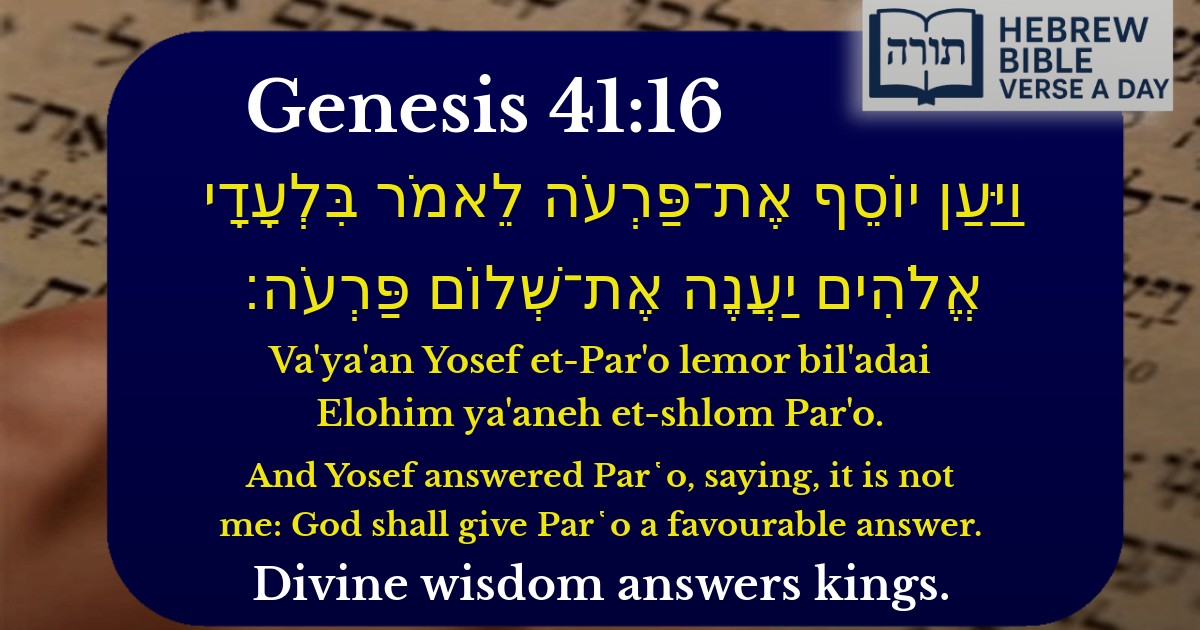Join Our Newsletter To Be Informed When New Videos Are Posted
Join the thousands of fellow Studends who rely on our videos to learn how to read the bible in Hebrew for free!
Hebrew Text
וַיַּעַן יוֹסֵף אֶת־פַּרְעֹה לֵאמֹר בִּלְעָדָי אֱלֹהִים יַעֲנֶה אֶת־שְׁלוֹם פַּרְעֹה׃
English Translation
And Yosef answered Par῾o, saying, it is not me: God shall give Par῾o a favourable answer.
Transliteration
Va'ya'an Yosef et-Par'o lemor bil'adai Elohim ya'aneh et-shlom Par'o.
Hebrew Leining Text
וַיַּ֨עַן יוֹסֵ֧ף אֶת־פַּרְעֹ֛ה לֵאמֹ֖ר בִּלְעָדָ֑י אֱלֹהִ֕ים יַעֲנֶ֖ה אֶת־שְׁל֥וֹם פַּרְעֹֽה׃
וַיַּ֨עַן יוֹסֵ֧ף אֶת־פַּרְעֹ֛ה לֵאמֹ֖ר בִּלְעָדָ֑י אֱלֹהִ֕ים יַעֲנֶ֖ה אֶת־שְׁל֥וֹם פַּרְעֹֽה׃
🎵 Listen to leining
Parasha Commentary
📚 Talmud Citations
This verse is quoted in the Talmud.
📖 Berakhot 55b
The verse is cited in a discussion about dreams and their interpretations, illustrating that interpretations come from God.
📖 Megillah 14a
The verse is referenced in the context of discussing the qualities of Joseph and his ability to interpret dreams, emphasizing divine inspiration.


Yosef's Humility and Divine Providence
In this verse (Bereshit 41:16), Yosef responds to Pharaoh's request to interpret his dreams by immediately attributing the ability to do so to Hashem rather than himself. The phrase "בִּלְעָדָי" ("it is not me") demonstrates Yosef's profound humility and recognition that all wisdom comes from the Divine.
Rashi's Explanation
Rashi comments on this verse that Yosef was emphasizing that the interpretation does not originate from his own wisdom, but rather from Hashem. This aligns with Yosef's earlier statement to the butler in prison (Bereshit 40:8), where he similarly credited Hashem with the ability to interpret dreams.
Rambam's Perspective
In Moreh Nevuchim (2:45), Rambam discusses prophecy and Divine communication, noting that true prophets always attribute their insights to Hashem. Yosef's response exemplifies this principle, distinguishing him from Egyptian magicians who claimed personal supernatural abilities.
Midrashic Insights
Halachic Implications
The Sforno notes that Yosef's response models proper conduct when one is asked to use special knowledge or abilities - we must acknowledge that all talents come from Hashem. This aligns with the halachic principle of giving credit to the true Source of our abilities.
Kabbalistic Dimension
The Zohar (1:183b) interprets Yosef's words as reflecting his connection to the sefira of Yesod, which channels Divine wisdom into the world while remaining humble and concealed like its namesake Yosef HaTzaddik.